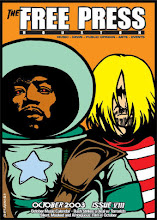Earth Days
Earth Days chronicles the environmental movement from its faint beginnings in the 1950s, its activism period of the 70s and up to the present. The emphasis is on the past and rightly so since many of those vintage clips of opulence and automobiles are suitable viewing in our current state on mass consumption. If you are the kind of person who wonders how to put the carbon cycle back in balance you want to see this film but its attraction extends to the curious in lieu of the subject. Earth Days presents its speakers and information in a highly accessible manner
Here are some of the talking heads Earth Days offers: Stewart Udall, former Secretary of Interior under Presidents Kennedy and Johnson; Denis Hayes, the non-compromising chief organizer of the original 1970 Earth Day; Stewart Brand, editor of the influential Whole Earth Catalog; Paul Ehrlich, author of non-fiction best seller The Population Bomb; Pete McClosky, congressman from California from 1967 to 1983 who was an outspoken proponent for environmental and endangered species rights; plus many other important voices. One thing becomes apparent while watching the political speeches and news clips from the 60s in Earth Days. We as a culture recycle the same images in our advertising over and over.
Earth Days attempts to put into perspective how people, starting just two generations ago, first realized that the planet's resources were finite. Rachel Carson's book Silent Spring warned of the dangers of pesticides on the environment. The civil rights movement provided momentum for other activism and the awareness of nature surely was a partisan cause. At this point in time the public at large had never seen a picture of the Earth from outer space. The film opens with clips of every president since Kennedy giving statements about the state of the air, land and water. There's some splendid footage to be sure, like the early 70s television commercial with the Indian crying at how his ground has been soiled.
Some of the doom and gloom didn't occur. I mean we are, after all, still here. And pollution today certainly isn't at levels such as in 1966 when people in New York City evidently died from smog. Earth Days has a lot of territory it covers but no one film or website or person could cover the entire depletion of Mother Earth. It's hard not to be ironic when topics on discussion include gasoline prices, the energy crisis and a decrease in the standard of living and the year is 1973.
In our unbelievable truth times much of the information on display in Earth Days isn't hard to believe, it's just hard to conceive how we as a society have ignored it for so long. Earth Days opens this Friday at the Angelika. Eventually the documentary will pop up on PBS in April of 2010.









0 Comments:
Post a Comment
<< Home